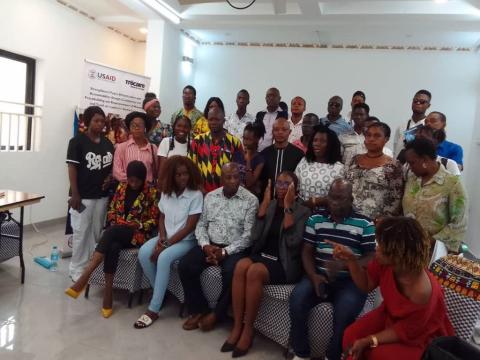By Sorie Ibrahim Fofanah
Trocaire, with support from USAID, has trained over thirty journalists on inclusivity and gender sensitivity.
The training which took place at the Royal Hotel in Makeni on the 7th of May 2024 saw the convergence of journalists from different regions across the country.
Speaking to Politico, the Chief of Party, USAID People to People Project, Samuel Konkofa Koroma said they train youths and women to have a voice and become leaders in their society, saying they have already trained and certified over 750 peace ambassadors across the project districts.
“Today is another special event that is in our project to train local journalists. We bring them together so that they will have more skills in reporting on issues of inclusivity and gender sensitivities,” Koroma added, noting that it’s the first media training they have conducted so far and hope to continue organizing such trainings in a bid to providing “new skills” to journalists.
He urged journalists to be mindful of the dictions they use to describe vulnerable and disable people in their stories, and that words used in reporting political issues must be selected carefully.
One of the facilitators at the training, Marian Amaria Bangura emphasized the need for journalists to be sensitive about gender issues in their reporting. Bangura claimed people have been silent over time on gender issues particularly women, which she attributed to perceptions and stereotypes, and blames women for sometimes shying away from talking to journalists.
She encouraged media people to use their skills to solicit interviews from such women. “As journalists, everybody’s side of the story is important,” she added, emphasizing journalists should ensure their stories are gender balanced.
Bangura advised journalists to also be careful with their choice of words in reporting gender issues, rather than using words that are peculiarly specific to one set of genders such as “policeman,” which according to her is ascribed to men. She suggested that “police officer” be used instead.
Bangura noted that journalists should seek to speak to other family female members or seek expert opinions if a female source declines to talk to them.
One of the participants during the training, Morlai Gbla told Politico, “I have learned a lot. One of the things I learned today is that it’s wrong to use certain words to describe disabled or marginalized people in the society and that there are better ways to describe them” he added.
Speaking on gender-sensitive reporting, Gbla went on to state that fair space should be given to both men and women.
Speaking to Politico, Princess Fatmata Kargbo, one of the participants expressed delight for participating in the media training. “We, as journalists should always be gender balanced in our stories and that we should not use certain words to describe physically challenged people,” Kargbo added, emphasising she learned a lot of things.
Copyright © 2024 Politico (13/05/24)








